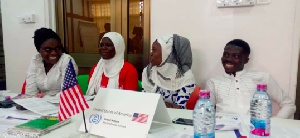 Some participants at a climate change workshop
Some participants at a climate change workshop
Climate change activist and cofounder of green Africa Organisation has called on Ghanaian youth to take mitigation of climate change as an individual priority in order to protect the environment.
Mr. Desmond Alugnoa said reducing one's carbon footprint and encouraging others to do so might not be enough but will continuously reduce the emission of carbo dioxide among other contributory factors into the environment.
Mr. Alugnoa was speaking at the No business As usual Hub during the weekend in the Ashanti region where 50 youth from different backgrounds within the Asakore Mampong Municipal were trained and given opportunity to act as world leaders.
The youth deliberated on ways to reduce emissions of carbon dioxide in order to combat climate change and manage crisis.
He told the Ghana Web ‘’Mining is one of the destructive factors when it comes to forest conservation and government upon government giving out lands for mining concessions. When are we going to act?
‘’But until we begin to act on it things will continue to go way back.’’ He added.
Speaking at the sidelines of the event, the No Business As Usual Hub programmes manager, Daniel Okity Boamah, made known the event was put in place to expose the youth to understand the phenomenon of changing climate and how they can contribute in solving the challenge it poses to humanity.
It was also an avenue for the youth to identify problems and how they can solve as well as monetizing them.
Climate change, also called global warming, refers to the rise in average surface temperatures on Earth.
An overwhelming scientific consensus maintains that, climate change is due primarily to the human use of fossil fuels, which release carbon dioxide and other greenhouse gases into the air. The gases trap heat within the atmosphere, which can have a range of effects on ecosystems, including rising sea levels, severe weather events, and droughts that render landscapes more susceptible to wildfires.
In Ghana, climate change has become a threat to livelihoods.
In Northern Ghana for instance, drought and severe flooding has become a yearly worry to the people.
In the southern, aquatic life are being affected as a result of human activities which has directly tampered with income levels of the people.
And along the banks of the Volta River, people are constantly displaced, homeless, and landless.
Since 2012, Ghana has come out with the National Climate Change Policy but has since been left to dust.
The event created a safe space for the youth from within Asokore Mampong to play a climate game where they acted as world leaders negotiating a climate deal.
It also widened their understanding of the climate challenge and helped them connect with others taking action on low carbon development.
A participant, Mr. Issah Ahmed Zakaria, told the Ghanaweb, his experience as that was the first time he’s modeling the United Nations and would share the knowledge acquired on climate change to his colleagues’ even if it would take him to explain in the local dialect.
A student, of the University of Developmental Studies, Abbas Khairiya, also a participant, shared her sentiments on the rising danger of climate change.
She further blamed the governments for not doing enough on issues related to climate change in Ghana.